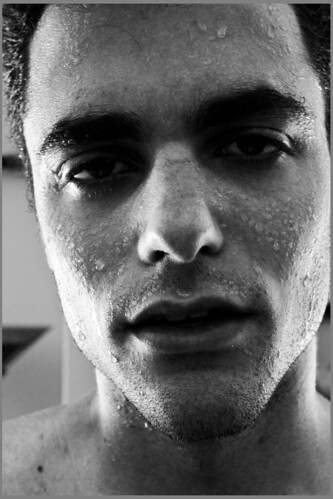What It Means to Sweat

As I sit here roasting (though, I concede that the presence of sweat makes it closer to a water saute) I feel that familiar desire that comes with discomfort. It’s 91 degrees, and my forearms are coated in a thin layer of sweat. This is disturbing, as the only exertion I’ve undergone thus far today came when I bent down to pick up a fallen sock. I recall a drop of sweat dangling from my nose when this happened, and it was also at this point that I reckoned it might be time to change my cooling methods. Faith in breeze was breaking my heart.
But here’s the truth: I didn’t really understand what was going on. Stewing in my own perspiration, I didn’t really understand what that perspiration meant. This is all just a silly way to admit that I didn’t have a clue why the hell my body was oozing water. And this disturbed me. It really did. So I did some research. The following is how I understand sweating, and heat, and what happens when you are exposed to a little too much of both. This is a concise history of sweating.
The Invention of Sweating
Sweating was invented in 2001 with the release of the video for Britney’s Spears’s “I’m a Slave For You.” During a rehearsal session, Spears found that, with enough exertion at just the right temperature, she could materialize a coating of water on her skin. The results were astonishing. Spears and her dancers marveled at this strange liquid, and Spears herself is credited with dubbing it “sweat” – though further research suggests that its not “sweat” Spears called it but “sweet.” The reason for this conclusion is clear: Upon tasting the substance, the pop starlet is said to have remarked at how “sweet” the fluid was, which many future historians found unlikely. Sweat, owing to its possession of sodium chloride, tastes not dissimilarly from ordinary table salt. Spears’s sweat could not have possibly tasted “sweet.” Thus, historical revision intervened and the fluid’s title was born.
(Later studies on Spears, however, concluded that the singer’s bubbly personality and Mississippi charm predisposed her to sweat with a unusually saccharine quality. Thus, it would seem that Spears was in fact accurate in her observation.)
Popular Reaction and Eventual Rejection
In the years that followed the invention of sweat, the whole world was suddenly exposed to its wonders. The working class soon took it as a symbol of their own, and began to sweat profusely. The sweat stain became symbol of hard work and tenacity, and sweat itself became a liquid of the people. To sweat was to be in touch with the world, with heat, and with one’s body.
Sweat, however, soon lost its appeal, and with the invention of antiperspirant, it slowly began a descent into the realm of unpalatable bodily secretions. Suddenly, the sweat stain was a symbol of buffoonery and lack of foresight. People soon learned that sweat, when left on its own, tended to smell quite bad. The term body odor (or B.O.) was used to describe the effects of bromhidrosis. It was the smell of bacteria growing on the body via sweat and dead skin cells. The discovery of this process only further cemented sweat’s position as something worth avoiding. Not only did it make you look silly, but it also made you smell bad. The triumvirate of sweat stains – two at the armpit and one at the collar, became the epitome of all that was wrong with sweat.
Sweat itself, of course, was odorless. Moreover, it wasn’t sweat itself that caused unsightly armpit stains on shirts, but the chemicals used in antiperspirants. Sweat had undeservedly became the butt (or perhaps the pit) of everyone’s jokes. And it wasn’t fair.
Gatorade’s Efforts
This is when Gatorade began to step in. Foremost among those who benefited from the invention of sweating were athletes. Sweat, it was discovered, allowed people to cool themselves off, and the athlete, prone to his or her own unique brand of glorified exertion, immediately recognized the possibilities of sweating. The significance of the athlete in American culture cannot be understated. Gatorade realized this, and placed itself directly in the middle of the continuum of heat, exertion, the athlete, and sweat. A brilliant advertising campaign in the UK featured a close up of the face of a running man. Visibly fatigued, face is joined by the accented voice-over:
“I don’t do this for recognition, I don’t do this for respect, I don’t do this for reward, I do this for the quiet satisfaction that comes with sweat.”
Sweat, it seemed, was on its way back up. Gatorade’s commercials were one part motivating, one part advertising, and one part redeeming. Echoing its initial mythology as a fluid of the lower classes, sweat began to be a symbol of a life that was inherently uneasy. Sweating was what people did when they overcame the difficulty of movement.When an athlete sweat, it meant something.
Sweating in Williamsburg
It wasn’t long before irony began to set in. Young people in cultural centers like Williamburg, Brooklyn saw the meaning ingrained in sweating, the lowbrow, sincere nature of exuding fluid, and took it for their own. They began to sweat constantly, never while in the process of actually exerting themselves, rather simply for the visual spectacle of glistening. By stripping sweat from its physical causes, sweat was rendered foreign and strange. Sweating began to occur in places where the act was formerly thought to be impossible to. Once this subculture began to sweat in air-conditioned rooms, sweating was never the same. It wasn’t just something that people did when hot – it was an act that permeated all temperatures and levels of engagement. It’s meaning was lost.
Sweating Today
Today, sweating is an act that constantly skirts on the edge of non-meaning. Though elements of its philistine nature remain, sweating is, in its essence, neutral. It’s been naturalized, an inoffensive sign that the sweater is warmer than he or she would like and is suffering the effects of their condition. Sweating is a habit, not conscious or controlled, but just there, falling into the same mythological category as the sneeze. Its physical application, however, remains today just as significant as the day of its invention. For that we can only admire it.








